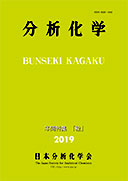
BUNSEKI KAGAKU
Scope & Guideline
Championing Rigor in Analytical Research
Introduction
Aims and Scopes
- Analytical Method Development:
The journal emphasizes the development of new analytical methods, particularly those that enhance sensitivity, specificity, and efficiency in various applications such as food safety, environmental monitoring, and biomedical analysis. - Application of Advanced Techniques:
BUNSEKI KAGAKU publishes research on the application of cutting-edge technologies such as microfluidics, chromatography, mass spectrometry, and biosensors, showcasing innovative solutions to complex analytical challenges. - Environmental and Food Safety Analysis:
A significant focus is placed on the analysis of pollutants, contaminants, and nutrients in environmental samples and food products, reflecting the journal's commitment to public health and safety. - Integration of Nanotechnology and Materials Science:
The journal highlights the integration of nanotechnology in analytical methods, exploring novel materials and devices that improve detection capabilities and analysis precision. - Interdisciplinary Approaches:
Research that combines analytical chemistry with other disciplines, such as biology, engineering, and environmental science, is prominently featured, promoting a comprehensive understanding of analytical challenges.
Trending and Emerging
- Microfluidic and Miniaturized Systems:
There is a growing trend towards the development of microfluidic devices and miniaturized analytical systems, allowing for on-site analysis and enhanced portability of analytical methods. - Biosensors and Bioanalytical Techniques:
The journal shows an increasing focus on biosensors and bioanalytical methods, which utilize biological components for the detection of analytes, reflecting an interdisciplinary approach to analytical chemistry. - Environmental and Green Chemistry Innovations:
Research emphasizing environmentally friendly analytical methods and sustainable practices is on the rise, aligning with global efforts towards sustainability and reduced environmental impact. - Nanomaterials in Analytical Chemistry:
The use of nanomaterials for enhancing detection methods and developing novel sensors is a prominent theme, indicating a shift towards incorporating nanotechnology in analytical practices. - Real-time and In Situ Analysis:
There is a notable increase in research focused on real-time and in situ analytical techniques, which are crucial for immediate data acquisition and monitoring in various fields including environmental science and biomedicine.
Declining or Waning
- Traditional Spectroscopic Techniques:
There has been a noticeable decrease in papers focusing solely on traditional spectroscopic methods, such as UV-Vis and basic fluorescence techniques, as researchers increasingly adopt more advanced technologies. - Basic Chromatographic Techniques:
While chromatography remains a core area, there is a waning interest in basic techniques without innovative adaptations, as the field moves towards more sophisticated systems that integrate multiple detection methods. - Standard Reference Material Development:
The publication of papers specifically dedicated to the development of standard reference materials has decreased, possibly due to a shift towards more application-focused research rather than foundational material characterization. - Conventional Chemical Sensing Methods:
Research on conventional chemical sensors is less frequent, suggesting a transition towards more complex sensor systems that leverage nanotechnology and advanced materials for improved sensitivity and selectivity.
Similar Journals
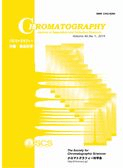
Chromatography
Elevating analytical science through rigorous chromatography studies.Chromatography is an esteemed journal published by the SOC CHROMATOGRAPHIC SCIENCES, dedicated to advancing the field of chromatographic techniques and their applications across various disciplines, including analytical chemistry, biochemistry, and environmental science. By facilitating the exchange of high-quality research, Chromatography plays a pivotal role in enhancing methodologies and technologies that drive innovation in sample analysis. While the journal is not currently open access, it maintains a rigorous peer-review process, ensuring the publication of valuable and impactful studies. Researchers, professionals, and students alike can benefit from its comprehensive coverage of chromatography-related advancements, making it a vital resource for anyone engaged in this dynamic area of study.

ANALYTICAL AND BIOANALYTICAL CHEMISTRY
Exploring Breakthroughs in Analytical ScienceANALYTICAL AND BIOANALYTICAL CHEMISTRY, published by SPRINGER HEIDELBERG, is a leading international journal that serves as a vital platform for innovative research in the fields of analytical and bioanalytical chemistry. With an impressive impact factor and ranking in the Q2 category for both Analytical Chemistry and Biochemistry, the journal highlights key advancements and methodologies that drive the discipline forward. Established in 1996 and continuing vigorously into 2024, it has gained significant recognition with Scopus rankings placing it in the 83rd and 78th percentiles within its categories, underscoring its impact and relevance. The journal's commitment to open access facilitates widespread dissemination of critical scientific knowledge, making it an essential resource for researchers, professionals, and students dedicated to exploring the complexities of chemical analysis. With its base in Heidelberg, Germany, ANALYTICAL AND BIOANALYTICAL CHEMISTRY continues to inspire and influence the global research community.

Analytical and Bioanalytical Chemistry Research
Exploring Innovations in Chemical Analysis.Analytical and Bioanalytical Chemistry Research is an esteemed open-access journal published by the Iranian Chemical Society, dedicated to the advancement of knowledge in the fields of analytical chemistry, biochemistry, and spectroscopy. Since its inception in 2014, this journal has provided a platform for researchers, professionals, and students to publish and access high-quality research articles that contribute to the understanding of chemical analysis and bioanalytical methods. With an ISSN of 2383-093X and an open-access model that promotes global dissemination of findings, it ensures that innovative research reaches a broad audience. The journal has consolidated its presence in the scientific community, currently ranked in quartile Q4 for analytical chemistry, biochemistry, and spectroscopy as of 2023. Its Scopus rankings, including a percentile of 34th in Analytical Chemistry, reflect its commitment to quality research and scholarly contribution. Situated in Tehran, Iran, the journal serves as a vital resource for academic discourse, offering insights into emerging trends and methodologies in analytical and bioanalytical chemistry.
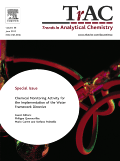
TRAC-TRENDS IN ANALYTICAL CHEMISTRY
Unveiling Trends that Shape the Future of ChemistryTRAC - Trends in Analytical Chemistry is a prestigious journal published by Elsevier Science Ltd, situated in the Netherlands. With an impressive impact factor reflected in its Q1 rankings across three major categories—Analytical Chemistry, Environmental Chemistry, and Spectroscopy—this journal stands at the forefront of disseminating pioneering research and advancements in the field of analytical chemistry. Established in 1981, TRAC provides a comprehensive platform for researchers to share influential studies and insights related to the latest trends, methodologies, and technologies in analytical techniques. Recognized globally, the journal excels in fostering cross-disciplinary dialogue and innovation, making it an indispensable resource for academics, professionals, and students alike. Explore the latest issues to stay abreast of cutting-edge developments that shape the analytical sciences.
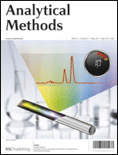
Analytical Methods
Unleashing Potential Through Analytical InnovationAnalytical Methods, published by the renowned Royal Society of Chemistry, is a distinguished journal that has been serving the scientific community since its inception in 2009. Specializing in the fields of Analytical Chemistry, Chemical Engineering, and General Engineering, this journal holds a reputable position with an impressive Q2 ranking in three relevant categories as of 2023. With its focus on innovative methodologies and advanced applications in analytical science, it aims to disseminate cutting-edge research and foster dialogue among researchers, professionals, and students. Although it is not an open access publication, it is accessible worldwide and provides critical insights into the latest developments in analytical techniques and their engineering applications. The journal also ranks highly in pertinent Scopus categories, such as being in the 77th percentile for General Engineering and 61st percentile for Analytical Chemistry, underlining its significance in advancing knowledge and practical applications in these fields. By participating in this journal, readers can expect to engage with high-quality research that influences the future of analytical practices and chemical engineering.

Food Analytical Methods
Innovating analytical approaches for a sustainable food future.Food Analytical Methods, published by Springer, is an esteemed journal dedicated to the innovative field of analytical methodologies within the food sciences. With an ISSN of 1936-9751 and E-ISSN of 1936-976X, this journal serves as a pivotal platform for researchers and professionals to exchange insights, methodologies, and findings related to food quality analysis, safety measures, and innovative technologies in food science. As of 2023, Food Analytical Methods boasts impressive Scopus rankings, including Q2 in Analytical Chemistry and Food Science, positioning it among the top journals in its category. The journal's commitment to enhancing food safety and quality through rigorous research underscores its importance in both academic and industrial applications. Although it does not currently operate under an open-access model, it provides exceptional value through its rigorous peer-review process and comprehensive publication standards, further inviting contributions from both established and emerging scientists in the field. With coverage spanning from 2008 to 2024, this journal continues to address critical research areas, thereby shaping the future of food analytics.

CHROMATOGRAPHIA
Pioneering Discoveries in Chemistry and BiochemistryCHROMATOGRAPHIA is a renowned scholarly journal published by Springer Heidelberg, specializing in the field of analytical chemistry, biochemistry, and organic chemistry since its inception in 1968. With its ISSN 0009-5893 and E-ISSN 1612-1112, the journal has maintained a robust profile, currently ranking in the Q3 and Q4 quartiles within significant Chemistry categories. Aimed at researchers, professionals, and students, CHROMATOGRAPHIA serves as a critical platform for disseminating innovative research, methodologies, and advancements related to chromatography and its applications in various scientific fields. While the journal is not open access, it offers significant visibility and scholarly contribution opportunities, making it an essential resource for those engaged in the vibrant intersection of chemistry and biochemistry.
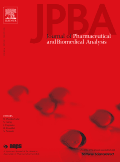
Journal of Pharmaceutical and Biomedical Analysis
Innovative insights for tomorrow's drug discovery.The Journal of Pharmaceutical and Biomedical Analysis, published by ELSEVIER and available in print and online formats, stands as a pivotal source of knowledge in the realms of Analytical Chemistry, Clinical Biochemistry, Drug Discovery, and Pharmaceutical Science. With an ISSN of 0731-7085 and an e-ISSN of 1873-264X, this journal is dedicated to publishing high-quality research that advances the understanding and development of analytical techniques in pharmaceuticals and biomedicine. The journal has earned a solid reputation, reflected in its Q2 category rankings across five distinct fields for 2023, and boasts impressive Scopus rankings, signaling its robust impact within the academic community. The Journal of Pharmaceutical and Biomedical Analysis serves as an essential resource for researchers, professionals, and students alike, providing actionable insights and fostering innovation that can directly influence future advancements in drug development and biomedical applications.

LCGC EUROPE
Connecting researchers to the pulse of chromatographic advancements.LCGC EUROPE is a prominent journal dedicated to the field of analytical chemistry, specifically highlighting the latest trends and innovations in chromatographic techniques. Published by MJH Life Sciences, this journal has served as a valuable resource for researchers, professionals, and students interested in the nuances of laboratory practices and the advancement of instrumentation. Although LCGC EUROPE ceased its coverage in Scopus from 2018, it has maintained a significant influence within the community, evidenced by its Scopus rank of 90/114 in Analytical Chemistry, placing it in the 21st percentile. With its inception dating back to 1996, the journal provided essential insights and peer-reviewed articles, fostering a rich understanding of chromatographic science. While the journal is not currently open access, it remains an integral part of the literature for anyone engaged in the analytical chemistry landscape, especially as it pertains to laboratory methodologies and innovations.

MICROCHEMICAL JOURNAL
Catalyzing Progress in Microchemical MethodologiesMicrochemical Journal, published by Elsevier, stands as a leading scholarly publication in the fields of Analytical Chemistry and Spectroscopy, boasting impressive rankings of Q1 and Q2 in their respective categories for 2023. With an H-index reflecting its substantial impact and relevance, this journal has been a cornerstone of research dissemination since its inception in 1957, and it continues to play a vital role in advancing the methodological and technological innovations within these disciplines. The journal presents peer-reviewed articles that explore a wide array of topics, making it an essential resource for researchers, professionals, and students keen on the latest advancements in microchemical processes and techniques. Although it does not currently offer open access options, its publication through Elsevier ensures a high standard of academic integrity and wide accessibility through various academic institutions. With a strong Scopus ranking—9th in Chemistry Spectroscopy and 22nd in Analytical Chemistry—Microchemical Journal is an indispensable platform for empirical studies, insightful reviews, and pioneering methodologies in the microchemical domain.